Panel discussion: acellular regenerative medicine
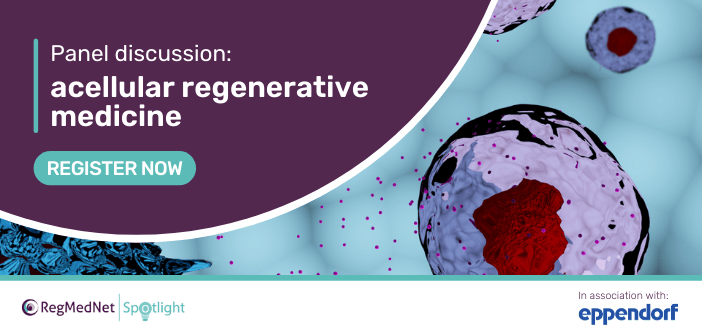
Tuesday 28th September 2021
07:00 [PDT] 10:00 [EDT] 15:00 [BST]
The use of exosomes as a cell-free therapeutic tool has shown great promise in the field of regenerative medicine. Exosomes offer several advantages over cell-based approaches, including exceptional stability and biocompatibility. However, manufacturing exosomes requires the production of clinically relevant amounts of high-quality vesicles and the exosome production workflow brings about many opportunities for variability and challenges.
In this panel discussion, key thought leaders from institutions across the world will discuss the current landscape of acellular regenerative medicine, particularly surrounding the use of extracellular vesicles (EVs) as a cell-free therapy. Our panel of experts will also explore how researchers across the globe are characterizing EVs, the biggest challenges faced during the production workflow and how the field may evolve in the future.
This webinar was recorded on 28 September 2021.
What will you learn?
- Key approaches and techniques used to characterize EVs
- The biggest challenges faced when using, producing and manufacturing EVs
- How to ensure standardization of your upstream process
- Which cell culture parameters impact the quantity/quality of EVs most
Who may this interest?
- Graduate students, researchers and practitioners working in the multidisciplinary field of acellular regenerative medicine
- Individuals with an interest in acellular regenerative medicine
- Regenerative medicine investors
- Therapy manufacturers
Speakers
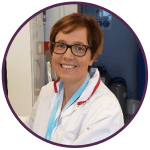
Aurélie Tacheny
Project Manager & Application Specialist
Eppendorf Application Technologies (Namur, Belgium)
After obtaining a PhD in cell biology from the University of Namur (Belgium), and with more than 10 years’ experience in the academic field, Aurélie Tacheny is now working as a Project Manager and Application Specialist for Eppendorf Application Technologies (Namur, Belgium), where she has been for 6 years. Aurélie is responsible for various cell culture-related projects and, together with her lab group, she uses her expertise in this field to generate valuable experimental data and supports current and future Eppendorf products and customers.
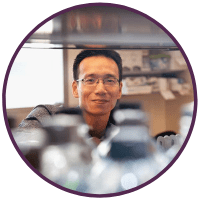
Ke Cheng
Professor of Regenerative Medicine
NC State University (NC, USA)
Ke Cheng is a Professor in the Department of Molecular Biomedical Sciences at the College of Veterinary Medicine and a Professor in the UNC/NCSU joint Department of Biomedical Engineering (NC, USA). He is also an Adjunct Professor at the UNC Eshelman School of Pharmacy and UNC School of Medicine. He directs the BioTherapeutics Lab, which focuses on stem cells, biomaterials and nanomedicine for heart and lung regeneration. His lab also studies novel mechanisms of cell extravasation, termed angiopellosis.
Prior to this position, Dr Cheng was an Assistant Professor at Cedars–Sinai Medical Center and University of California Los Angeles School of Medicine (both CA, USA), where his research focused on stem cells and regenerative medicine in animal models. He also served as the director of the stem cell lab for multiple clinical trials including a clinical trial using patient’s own cardiac stem cells to treat heart attack. Dr Cheng’s formal education began with a BSc in Pharmaceutical Engineering from the Zhejiang University (Hangzhou, PR China), followed by a PhD degree in Biological Engineering from University of Georgia (GA, USA).
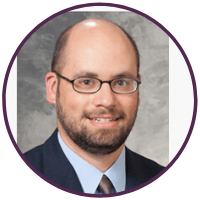 Christian Capitini
Christian Capitini
Associate Professor of Pediatrics
University of Wisconsin-Madison (WI, USA)
Christian Capitini leads an NIH-supported laboratory focusing on development of cell-based therapies, including NK cells and CAR-T cells, for the treatment of childhood cancers such as neuroblastoma and osteosarcoma. The laboratory also manufactures alternatively activated macrophages for complications of hematopoietic stem cell transplant, including graft-versus-host-disease and acute radiation syndrome.
In the clinic, Dr Capitini was a Principal Investigator for the first multi-center CAR-T cell trial, which led to US FDA approval of tisagenlecleucel (Kymriah®) for the treatment of recurrent/refractory B-cell leukemia in children. He remains a site PI for trials testing Kymriah as an upfront therapy for high-risk B cell leukemias and for treatment of relapsed non-Hodgkin lymphoma.
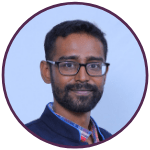 Arun Chandru
Arun Chandru
Co-Founder and Director
Pandorum Technologies (Bengaluru, India)
Arun Chandru is Co-founder and Director of Pandorum Technologies, a tissue engineering and regenerative medicine start-up with a focus on the human cornea, liver and lungs. Pandorum’s bioengineered Liquid Cornea induces and supports transparent regeneration of scarred corneas in vivo, as demonstrated in diverse animal models. This promising technology is undergoing IND-enabling studies, and is poised to enter clinical studies in 2022.
Founded in 2011 by academic entrepreneurs, Pandorum Technologies has been supported by the Government of India and marquee investors, and has received notable awards. The company has labs in Bangalore (India) and San Carlos (CA, USA), and works with partners in India, the USA and Europe.
In association with
